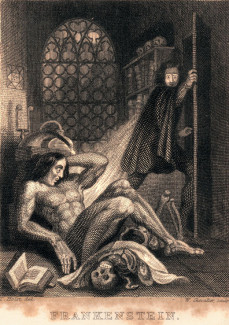
Johns Hopkins UniversityEst. 1876
America’s First Research University
It's Alive!: The state of Frankenscholarship

To help celebrate the bicentennial of Mary Shelley's novel Frankenstein in 2018, Literature and Medicine published a themed issue on "Chemistry, Disability, and Frankenstein." The issue featured 11 essays covering a wide swath of subjects related to the famous work. With a growing field of "Frankenscholarship," emanating from the anniversary, guest editors Allison B. Kavey and Lester D. Friedman found a unique connection between the essays published in the issue. Kavey joined us for a Q&A about the issue and the future of Frankenstein studies.

You talk about the intensity of Shelley scholarship in recent years. How gratifying was it to find new ways to examine her work?
I think Les and I were very excited to see two new and interesting avenues of scholarship develop in this collection. We did not anticipate such consistency in the approaches our authors took, but we really were impressed to see the history of disability material form a strong group and the history of chemistry form the other. Both approaches develop existing scholarship in their respective sub-fields and also contribute to how we think about Frankenstein.
How did putting this issue together expand your knowledge of Shelley and Frankenstein?
We have been working on Frankenstein for about 5 years now, and I know I am always impressed by how much material this novel offers scholars. I was really happy to work on the book in a completely different way (bioethics) than I previously had done, and I went in to get very excited about the idea of scientific immortality in it as well. It invites scholarship in a way few books do.
How did you settle on Literature and Medicine as the right journal for this collection?
Literature and Medicine seemed the perfect fit because of the novel’s standing in medical humanities scholarship. The disciplines we engaged here outside of the title - history of medicine, history of science, bioethics, and medicine and film - have all found a great home in this journal.
With what you call "the tower of academic output" surrounding Frankenstein, what do you see in the future of this area of study?
I am constantly amazed by how flexible and inviting this novel is for scholarship. I can see a lot of interesting work emerging in the area of disability studies, and the history of science should be paying a lot of attention to this novel. I can’t wait to read the next set of articles and books!


